|
The centre of attraction at the conference was two foreign guests---one Dr Abdul Hamid A Abu Sulayman, Director General, Dar Manar Al Raid for Educational Consultation, Riyadh (Kingdom of Saudi Arabia) and former Rector, International Islamic University Malaysia; and the other Dr Samir Q Fakhro, Advisor to UNESCO on Information Technology and Education in Bahrain. Both are men of letters and have got international reputation for their contribution to the world of knowledge and practice.
Besides, there were too present eminent personalities like Kumari Nirmala Deshpande, Member of Parliament, famous Gandhian ideologue and activist as well as a close associate of Bhoodan movement (a movement for donation of land by the rich to the poor) leader late Acharya Vinoba Bhave; Surendra Mohan, Socialist ideologue; Rajiv Vora, Asia Coordinator, Non-Violent Peace Force; Dr J K Jain, Chairman, Jain TV Group and social activist; Madhu Kishwar, Professor, Centre for the Study of Developing Societies and Editor of women magazine “Manushi”; Digant Oza, veteran journalist from Ahmedabad; Dr Kumar Rajiv, scholar and social activist; Prof A R Momin, former Vice Chancellor, Bombay University; Prof D Prempati, academic and Dalit leader.and Prof Nejatullah Siddiqui, eminent Islamic economist and International King Faisal laureate. Prof Saifuddin Soz, Union Minister of State for Water Resources and K Rahman Khan, Deputy Chairman, Rajya Sabha too graced the occasion with their active participation.
Apart from them, there were, of course, three masterminds of the lively programme---Dr Mohammed Manzoor Alam, Chairman, IOS and economist; Dr Z M Khan, Secretary General, IOS and political scientist; and Dr Ausaf Ahmad, Editor, “Mutalle’at”, a New Delhi-based prestigious Urdu thought-provoking monthly and former economic advisor, Islamic Development Bank, Jeddah (KSA) and others.
The two-day conference began on November 3. Dr Manzoor Alam, in his welcome address, said: “We acknowledge the challenges that the 21st century is throwing before us: across the world new political and economic equations are being forged at a time when forces of globalization are unifying and bringing us together at different levels. We are all being equally affected, sometimes adversely, by political and macro-economic environments of our world. But we are convinced that the world needs to be driven on the power of peace and not on the power of war.”
Afterwards, Justice A M Ahmadi, former Chief Justice of India, in his inaugural address, averred “The power of peace is mightier than a sword. It is a strategy that binds different forces together. Mere talk of peace won’t bring a durable peace. One would have first faith in it. Only then it would bear fruits.”
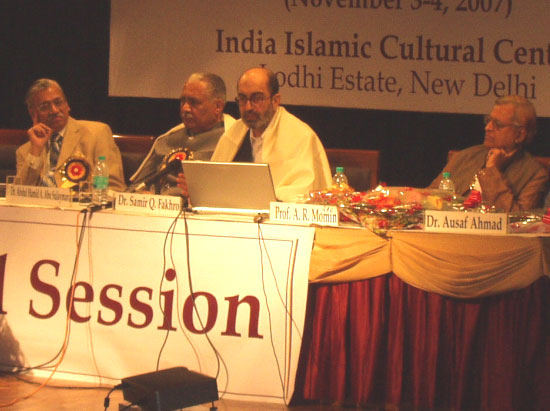
L-R: Justice A M Ahmadi, Dr Abdul Hamid A Abu Sulayman, Dr Samir Q Fakhro and Prof A R Momin
Dr Samir Q Fakhro, in his keynote address, opined that peace originated from heart and mind. Therefore, one would have first to be clear that talk of war in any form would ruin the purpose. Prof Fakhro also said that establishment of peace was the responsibility of not only people but the governments too.
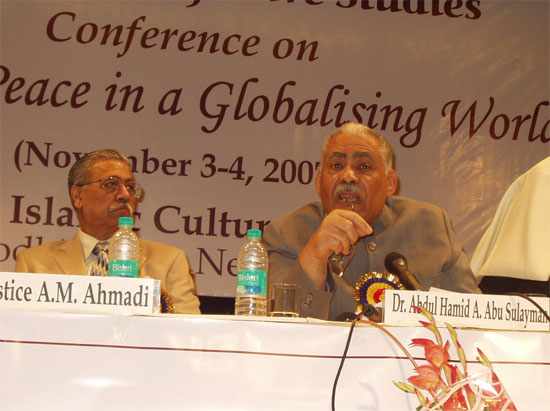
L-R: Justice Ahmadi and Dr Abu Sulayman (Speaking)
Prof Abdul Hamid A Abu Sulayman, in his presidential address, said at a time when the world was confronted with chaos and unrest, the power of peace was needed most. According to him, as the word ‘Islam’ came from salaam, meaning peace, it always stood for peace and to link it with terrorism was totally wrong and unjustified.

L-R: Dr M Nejatullah Siddiqui, Dr Manzoor Alam and Kumari Nirmala Deshpande
On the second and concluding day, there were held three business sessions. In the first session on the sub-theme “Peace in Asia: Challenges and Opportunities”, chaired by Dr Manzoor Alam, Kumari Nirmala Deshpande said: “Although we are living in a nuclear era, most of us are unaware of the nuclear threats and hazards.” She said that the present atmosphere of war and confrontation would change only through people’s involvement because the people all over the world were frustrated with this atmosphere and were ready to respond to the call of peace. She also said that in the USA itself that has emerged as the ‘symbol of violence’, a movement of peace was taking roots there and it was becoming a centre of the international movement for peace.
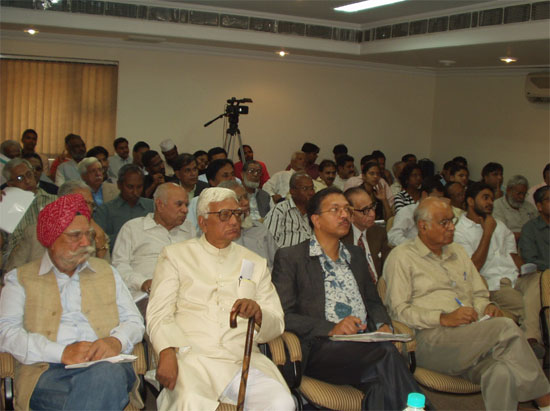
L-R: A view of the participants
However, there arose a controversy when the Gandhite ideologue, also known as ‘Didi,’ referring to the Emergency imposed in Pakistan on November 3, 2007, and earlier in India on June 26, 1975, justified the harsh measures and force adopted sometimes for a brief period to bring in peace. It is point out that Kumari Nirmala Deshpande was a disciple of late Acharya Vinoba Bhave who had termed the Emergency imposed in India as the “Anushasan Parva” (Festival of Discipline).

L-R: Dr Kumar Rajiv (Speaking), Dr Nejatullah Siddiqui and Dr Manzoor Alam
Dr Kumar Rajiv said that today peace and non-violence had emerged as a great weapon. According to him, this weapon would bear fruits only when people would come forward to use it. He said in the past Gandhiji and Pandit Jawaharlal Nehru used it and some others in America like Dr Martin Luther King and in South Africa like Nelson Mandela followed them.
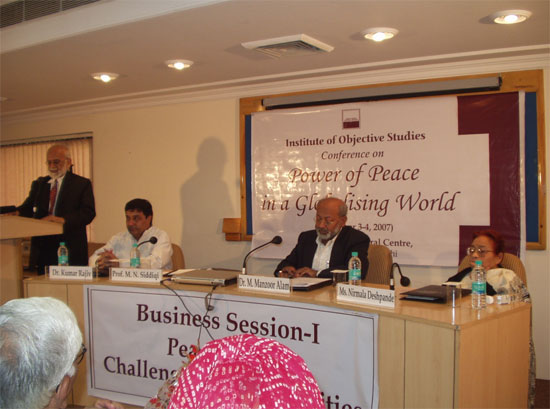
L-R: Dr Nejatullah Siddiqui (Speaking), Kumar Rajiv, Dr Manzoor Alam and Kumari Nirmala Deshpande
Dr Nejatullah Siddiqui opined that Islam was the ideology rooted in the Arabic word ‘salaam’ but unfortunately it was now being targeted by some people for “spreading terrorism”. He said that it was quite injustice with this ideology of peace.
In another session on “Role of Religion and Culture in Fostering Peace”, chaired by Dr Ausaf Ahmad, Prof Iqbal A Ansari, Secretary, Minority Council of India, said a durable peace was not possible without justice, and justice not possible without observing the conditions of human rights. Quoting Manusmiriti, Gandhiji and Pandit Nehru, he opined that the use of force had been used in the past for a just cause. According to him, it was Gandhiji who spoke “in favour of pushing back the Pakistani tribals from Kashmir in October 1947 with the use of force”. He said that the modern civilizations were based upon the rejection of God.
Dr J K Jain said that Secularism was founded by the West just to control the people’s lives by some concept other than religion. He also opined that Islam, not peace, was the issue. Therefore, the organizers of the programme should have had courage to make Islam the focus of the present discussion in the conference instead of peace, he said pointing towards Dr Manzoor Alam. According to him, the need of the hour was two points: one religiosity and the other tolerance.
Rajiv Vora said that the Western culture was not acceptable in India as it tantamount to cultural onslaught. He emphasized that the word ‘Satyagraha’, first used by Gandhiji in a book published on 9/ 11 in 1906, was still a force to reckon with to bring peace in the world. According to him, the book was dedicated to Mohammed Ali Cachalia, an NRI from Surat then living in South Africa. Last year this book was reprinted on the occasion of the first centenary of Satyagraha.
He said: “I don’t see today my image in India. That’s because this doesn’t satisfy my spiritual, political and economic needs and aspirations.” He declared that Western ideologies didn’t fulfill ‘our’ cultural needs too. According to him, “modern civilizations are destroying us spiritually, culturally, politically and economically.” Therefore, it was the responsibility of those believing in religions to come forward and assert. In his own words, if both Hindus and Muslims got united, there was no reason as to why Western civilization and culture reign over the world.
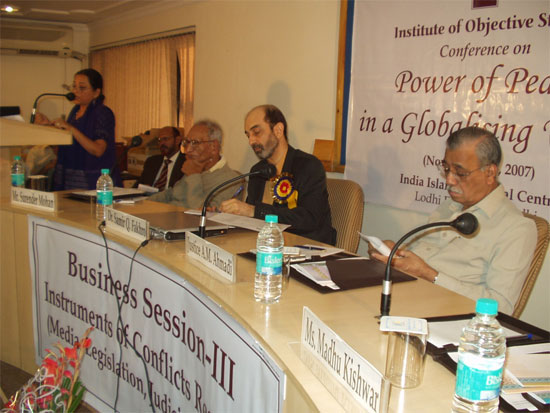
L-R: Madhu Kishwar (Speaking), Surendra Mohan, Dr Samir Q Fakhro and Justice Ahmadi
In the third session on “Instruments of Conflicts Resolution (Media, Legislation, judiciary and Education), chaired by Justice A M Ahmadi, Madhu Kishwar was of the view that all riots were engineered politically. She said that there were a large number of people committed to common cause of peace and non-violence. Then there was no reason as to why this concept didn’t flourish.
According to Surendra Mohan, an ideal society was essential if peace had to prevail upon. He dwelt in detail the process through which an ideal society based upon moral values, justice and equity could be shaped.
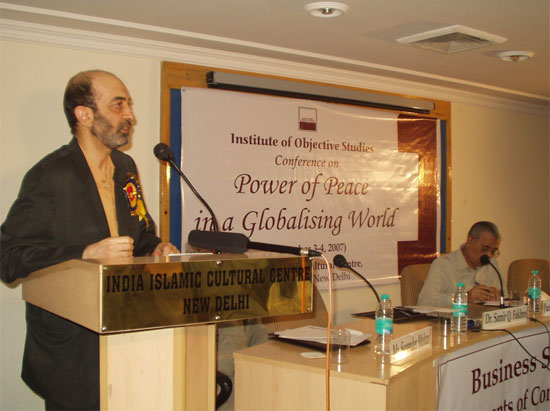
L-R: Dr Samir Q Fakhro (Speaking) and Justice Ahmadi
Dr Samir Q Fakhro threw light on the instruments of conflicts resolutions with respect to education and stressed the need to generalize the technical as well as the moral education.
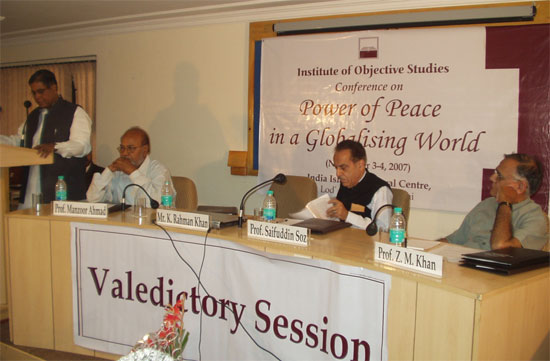
L-R: K Rahman Khan (Speaking), Prof Manzoor Ahmad, Prof Saifuddin Soz and Dr Z M Khan
The two-day conference with lively discussion upon different facets of conflicts and peace came to an end with the conclusion of the valedictory session, chaired by Prof Saifuddin Soz. In his valedictory address, K Rahman Khan said that to talk of peace and non-violence in a country that fought its entire Independence struggle through peace and non-violence was very much relevant today.
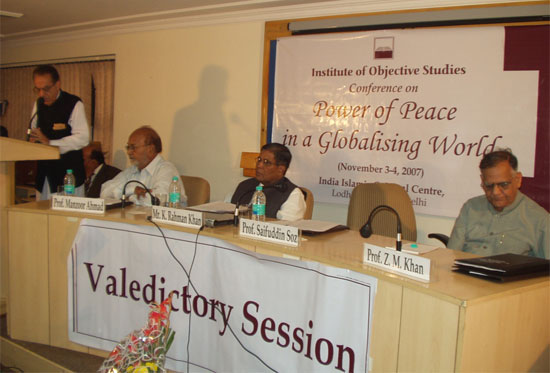
L-R: Prof Saifuddin Soz (Speaking), Prof Manzoor Ahmad, K Rahman Khan and Dr Z M Khan
Prof Saifuddin Soz, in his presidential remarks, said the power of peace was needed most in India as this country had been a victim of violence and other terror acts time and again. He opined that today it was very essential to abide by the policy of conciliation and understanding for maintaining peace and tranquility in the world. Besides, multi-religious dialogue was also needed to understand each other and promote tolerance, he added. According to him, if emphasis was made upon establishing peace on the lines of Prophet Mohammed’s “Hudaibiya Treaty”, the situation would change dramatically. He said that the whole world admitted the farsightedness of the Prophet (Peace be upon Him) in the case of Hudaibiya Treaty. In his own words, “this strategy to the cause of peace was so much impressive that Michael H Hart had to honour him with the top position in his internationally reputed book “The 100”.
A vote of thanks was proposed by Prof Manzoor Ahmad, Vice Chairman, IOS and former Vice Chancellor, Ambedkar University Agra.
Also See
Resolution of IOS Peace Conference
|